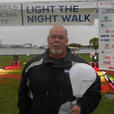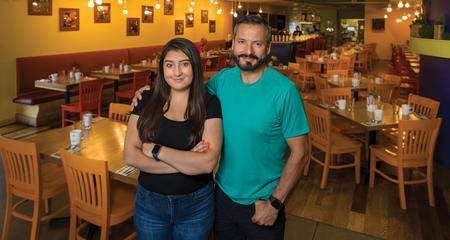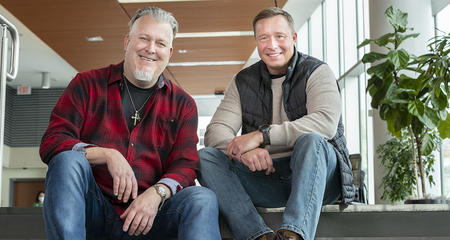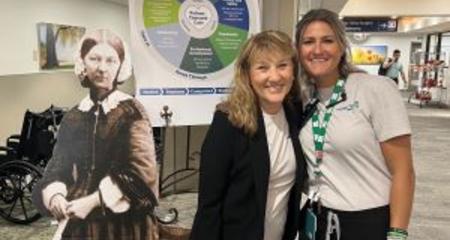Two years ago, on Jan. 13, 2014, life sent me on a journey. This journey was filled with fear, desperation, hope, friendship and love. Although much of the beginning of this journey is a blur to me now, the very start of it will live with me forever.
 I had an eye that was filling with blood, and my face was turning black and blue around the eyes. My wife, who is a nurse, talked me into seeing a doctor — or, more accurately, forcefully suggested I see a doctor because, as with a lot of men, it was not something I would normally do on my own. Still stubborn, I went to work, but promised I would call the doctor. I made the call at 8 a.m.
I had an eye that was filling with blood, and my face was turning black and blue around the eyes. My wife, who is a nurse, talked me into seeing a doctor — or, more accurately, forcefully suggested I see a doctor because, as with a lot of men, it was not something I would normally do on my own. Still stubborn, I went to work, but promised I would call the doctor. I made the call at 8 a.m.
As is the case with many doctors, I could not be seen that day. However, they suggested I go to urgent care. Of course, for me, that was not going to happen. But by 10 a.m. that day, I was feeling horrible and called my wife. She insisted I come to the ER at Froedtert Hospital. Within a half-hour, I was feeling even worse and drove to the hospital.
My wife met me at the ER, and within 30 minutes, I heard the words that strike you to the core — the brutal words I hope you never have to hear: "You have cancer." So many emotions whirled in my head, and tears welled in my eyes as I looked at my wife. The doctor was talking, but my mind was elsewhere until I heard, "You have good cancer."
"WHAT?" What did he just say? Good cancer? And the good-cancer journey began. Still trying to process what had just transpired in the ER, I was being whisked up to what they call 4NT. Within minutes, nurses were in my room starting IVs, and then a doctor came in and explained my "GOOD" cancer.
I had leukemia, a rare form called acute promyelocytic leukemia (APL). But if I could survive the week, I had a chance of survival. And if I could endure the first 30 days of treatment, I had a 90% chance of being cured. She then went on to explain that the treatment would last for three years, but said we needed to take it one day at a time.
The reality set in. I really was sick. I would be in the hospital for a minimum of 30 days. I needed red blood cells, I needed platelets and I needed chemo ASAP. I was bleeding internally. Within two hours of entering the ER, I was now receiving chemo starting with something called Idarubicin and, the shocker, ARSENIC. Why in the world would they be giving me rat poison?
With so many questions and still in shock, from this point on it turns into a blur: blood work constantly, arsenic every day — but before the arsenic, I might need platelets or blood depending on the blood work. I remember being given steroids, and I have been told I turned into quite the handful.
During this time, I needed to "get things in order." Wow, what an eye opener! Why had I not done this before? It would have been so much easier to do without the stress. I needed to do a Power of Attorney, Medical Power of Attorney, Living Will and Will.
After a little more than 30 days, I was discharged from the hospital. Throughout this, I was blessed with remarkably professional staff on 4NT. The nursing staff was always encouraging me. (They are amazing, right down to the ladies who cleaned and disinfected my room daily to keep infection and germs at bay.) I don't think we realize what special traits caregivers have — the dedication and compassion is unmatched. I was blessed to have met these people.
During my time as an inpatient, I was in need of numerous blood products, sometimes 2 or 3 times a day. I had never given blood much, though boy, has that changed now. Who are these complete strangers that saved my life? How did a friend of mine organize a blood drive on my behalf and have 40 people give this life-giving gift? And to have some of these people continuing to give ...
Shortly after I was admitted, it was suggested that I might find some benefit from contacting the Leukemia & Lymphoma Society. I had so many questions, and the call to them was another blessing. So much help getting information and support.
The "GOOD CANCER" journey continued. Now I was given a 30-day break from daily rat poison to gain strength, because I would need it when I faced another 30-day adventure with the poison. I was fortunate my doctor was going to try this on an outpatient basis at the Clinical Cancer Center's Day Hospital.
During my 30-day break, I started to reflect on what had transpired. The good, the bad and the ugly. Depression, anxiety, stress, compassion, friendship and unconditional love. I also felt the urge to explore how to help others facing this thing called cancer. My wife's coworker at the Clinical Cancer Center happened to mention my desire to get involved to her contact at the Leukemia & Lymphoma Society of Southeastern Wisconsin. Once I was able I would get involved with this organization — though it still was a little too early.
On my 30-day break, I was pretty much confined to the house, as again germs and I would not play well together, so the less I was exposed, the better. I started my next treatment at the Day Hospital, traveling every day from Hartford, Wis., to the Clinical Cancer Center at Froedtert Hospital. Every day started with the same routine: a blood draw to determine if my numbers would be OK for the arsenic or would I need blood products. I also got an EKG to make sure the old ticker was still hanging in there.
What I now found was I had the best cancer nurses caring for me — almost all of them certified oncology nurses. The level of expertise and experience I saw my first day there laid to rest my worry. From the receptionist at the desk every day a warm welcome, from the transporters a warm smile. I would spend a minimum of three hours receiving my treatment, but if the blood work was bad I could be there eight hours or more. This did not happen very often, but when it did, the staff was so accommodating.
I made it through the second 30 days. Now another 30-day break, and then we had to do it once again. All this comes with a price: I had developed some heart issues, lung issues, neuropathy — but I was winning my fight. Once I had completed my third 30-day treatment I would face two years of maintenance drugs. As of this writing, I have 189 days to go.
The GOOD CANCER lesson: Although the doctors told me I was lucky to have gotten good cancer and that it could be cured, I did not feel lucky at the time. What's so good about cancer? I believe I have found my good in cancer. I have developed a true respect for all aspects of care giving. I have learned the meaning of selflessness.
I have learned that life is a journey that can end in an instant, and we are not on it alone. I have learned how to be humble. I have learned the riches in life are not what we have, but what we appreciate. I have learned the true meaning of unconditional love. I have learned how to be compassionate. I have learned the answer to "Why me?" — and it's not why did I get cancer but why did I survive cancer.
Why did I get GOOD cancer? The Journey has just begun. My good cancer journey is to help others in some small way. I am an advocate. I am a fundraiser. I am a companion for others facing this disease. I am here.
When you die, it does not mean that you lose to cancer. You beat cancer by how you live, why you live and in the manner in which you live.
— ESPN anchor Stuart Scott (born 1965, died 2015)
Share Your Thoughts
What is your journey like? Are you able to find some "good" in your cancer diagnosis? Share your comments below.



